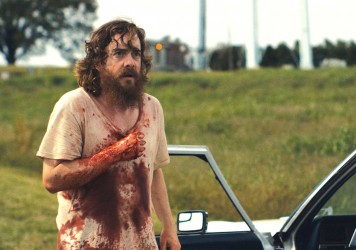There’s plenty to admire in Jeremy Saulnier’s follow up to Blue Ruin. But it’s not for the faint-hearted...
Being in politics today isn’t about being a good person, it’s about convincing the world of that fact. This is achievable through time honoured grit and determination, or actually being a naturally enlightened soul who has ideas and is able to communicate them to a broad, appreciative audience. Otherwise, you can linger behind a smokescreen where self-image and public perception will always trump real substance.
Jeremy Saulnier’s determinately nasty Green Room is about the insane lengths that some political movements will go to preserve some semblance of credibility, even when they have less-than-nothing going for them to start with. A neo-Nazi enclave working under the cover of an out-of-the-way punk venue struggle to convince the world that they’re just misunderstood softies wanting to distance themselves from past PR snafus.
The group is led by the guru-like Darcy Banker (Patrick Stewart), a manipulator, a big-picture player attempting to corral the hot-headed vermin of his brood into a respectable movement. Their ranking system is based on the colour of shoelaces, usually threaded onto the type of knee-high Doc Martens used to stomp faces into a bloody pulp. A period of tranquility comes to an abrupt end when a young inductee gets brutally stabbed, and there just happens to be a band passing through on tour who witness everything. What begins as just a very uncomfortable night on the schedule turns into a nightmare cover-up scenario where death becomes an inevitability.
Read our interview with director Jeremy SaulnierThe writer/director’s previous film, Blue Ruin, was praised for its terse, down-and-dirty treatment of thriller genre mechanics, and he’s bopping to the same beat with this new one. He establishes characters, marks outs the playing field, and pretty soon we have a punk rockers versus tooled-up neo-Nazis scenario, the bolted door of the eponymous green room the precarious ignition pin that’s preventing the whole place from blowing. The audience is party to both sides of the door, so we see how the band (the goodies), led by Anton Yelchin, plot their unlikely escape, and we see the neo-Nazis (the baddies) do their utmost to make sure this dark secret never gets out.
It’s all put together with great skill, but never quite manages to deliver more than its modest, stripped-back story will allow. Even the surprises ring a little hollow, folded into the action to self-consciously spice things up rather than to add any emotional resonance. But perhaps the film is more effective as an anti Nazi screed, mocking their delusions of grandeur and sincere belief that their politics have mass-market potential. The film’s most chilling aspect is Banker’s eminently cool organisation skills – he delivers orders to his minions like he was either waiting for this to happen, or it has happened many times before.
Green Room is about how modern politics is the process of averting a crisis. An impromptu encore shout out goes to British actress Imogen Poots as a distraught, panda-eyed skin who defects to the punks when she witnesses what her pals are really all about.
Published 10 May 2016
Jeremy Saulnier’s Blue Ruin hinted at great things.
Again, hints at greater things to come.
More to it that may meet the eye.

By David Hayles
From Repo Man to the Class of 1984, here are seven memorable examples of anarchy on the big screen.

By Anton Bitel
The Green Room director offers some sage advice on how to ride the wave of your first indie hit.

This hard-boiled, unironic revenge thriller is held together by a mesmerising lead performance from Macon Blair.